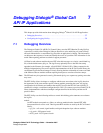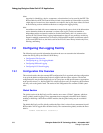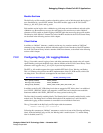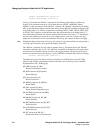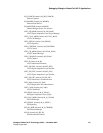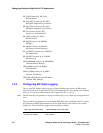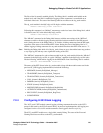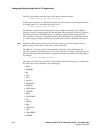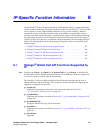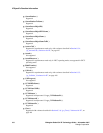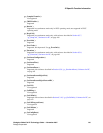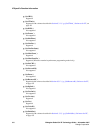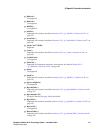384 Dialogic
®
Global Call IP Technology Guide — November 2007
Dialogic Corporation
Debugging Dialogic
®
Global Call API IP Applications
The h323_stack module in the RtfConfig.xml file begins with the statement:
<Module name="h323_stack" state="1">
Following this statement is an “MLabel” statement to set the local state of the Debug label, which
is disabled (state="0") in the default RtfConfig.xml file:
<MLabel name="Debug" state="0"/>
The “MLabel” statement for the Debug label interacts with the state settings of the “MClient”
elements to enable or disable logging from the individual software modules of the H.323 protocol
stack. Setting the state of the Debug label to "0" disables all debug statements from the H.323
stack, regardless of the states of the individual RTF clients. Setting the state of the Debug label to
"1" enables logging of debug statements for any stack modules that have their RTF client state to
"1".
Note: Enabling the Debug label while all of the h323_stack clients are set to the enabled state may
produce a huge log file and may cause heavy loading of the CPU.
The “MClient” statements for each software module in the h323_stack module follow the
“MLabel” statement in the RtfConfig.xml file. A typical “MClient” statement in the RtfConfig.xml
file looks like the following, which enables logging for the EMA stack module if the Debug label is
also enabled:
<MClient name="EMA" state="1"/>
The names of the RTF clients in the h323_stack module include the following (the † symbol marks
the clients that are most commonly used in debugging):
• EMA
• MEMORY
• RA
• CAT
• CM †
• CMAPI †
• CMAPICB †
• CMERR †
• TPKTCHAN †
• CONFIG †
• APPL
• FASTSTART †
• VT
• UNREG
• RAS †
• UDPCHAN
• TCP
• TRANSPORT
• ETIMER




